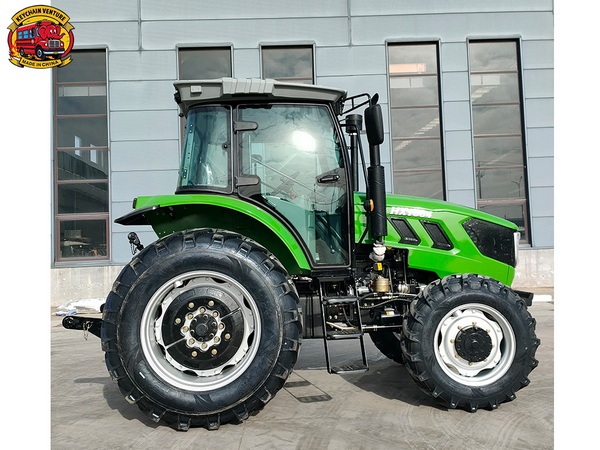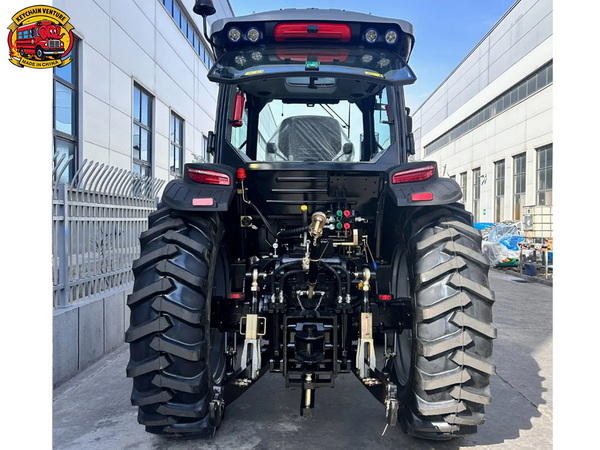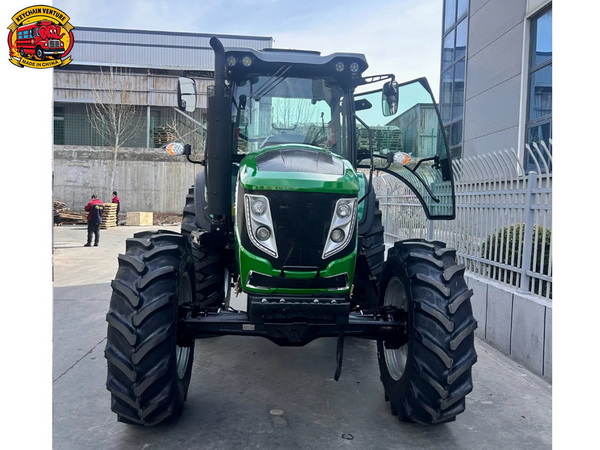Views: 222 Author: Amanda Publish Time: 2025-08-20 Origin: Site








Content Menu
● Factors Influencing the Cost of a Used Tractor
>> 3. Condition
>> 7. Location and Market Demand
● Typical Price Ranges for Used Tractors
● Buying a Used Tractor: Essential Considerations
>> Thorough Inspection Checklist
>> Test Drive
● Maintenance and Operating Costs
● Advantages and Disadvantages of Buying a Used Tractor
>> Advantages
● Financing a Used Tractor Purchase
● Environmental Impact and Sustainability
● FAQs
>> 1. What is the average lifespan of a used tractor?
>> 2. How does mileage affect the price of a used tractor?
>> 3. Are used tractors reliable for long-haul trucking?
>> 4. Can I get a warranty on a used tractor purchase?
>> 5. What maintenance should I prioritize after buying a used tractor?
When it comes to purchasing a used tractor, one of the most common questions buyers ask is, “How much does a used tractor cost?” Whether you are a commercial truck operator, a construction company, or a farmer looking to expand your fleet, understanding the price range and factors that determine the cost of a used tractor is critical. At KeyChain Venture Co., Ltd., a leading commercial vehicle supplier based in China, we specialize in providing both new and used heavy-duty trucks and buses with tailored solutions for domestic and international customers. This article will dive deep into the elements influencing used tractor prices, typical cost ranges, maintenance considerations, and buying tips designed to help you make an informed investment.

Before exploring the price, it's important to clarify what a used tractor refers to in the commercial vehicle context. Unlike farm tractors used in agriculture, a used tractor in trucking terms usually means a used tractor unit or semi-truck tractor —the powerful front part of an articulated truck that pulls trailers along highways. These vehicles are essential in the trucking industry for hauling heavy cargo over long distances.
The tractor unit, or "prime mover," is engineered to provide the power, stability, and control needed to tow large trailers safely and efficiently. Choosing a used tractor unit may offer cost advantages but requires careful evaluation to ensure the vehicle's reliability and longevity.
The price of a used tractor can widely vary based on several key factors:
Certain manufacturers have built a reputation for producing durable, reliable, and high-performance tractor units. Brands such as Volvo, Freightliner, Kenworth, Peterbilt, and Scania often command higher prices even on used models, thanks to their robust construction and dealer support networks. For buyers looking for dependable trucks with good resale value, opting for these brands can be a wise investment.
Chinese manufacturers have also made significant strides in recent years, producing competitively priced tractors that meet international quality standards. KeyChain Venture Co., Ltd., sources from both Chinese and international brands, offering diverse options for different budgets and applications.
Age and mileage remain among the most critical determinants of a used tractor's price. Newer models with less than 100,000 kilometers typically cost significantly more due to lower wear and newer technology. Conversely, tractors with 500,000 kilometers or more—or those operating beyond 10 years—tend to be more affordable but may require higher maintenance.
Mileage reflects the tractive work done by the tractor. High mileage suggests significant engine and drivetrain usage, which could mean parts are closer to needing replacement. However, a tractor with high mileage but solid maintenance records can still offer great value.
Condition carries heavy weight in pricing a used tractor. A vehicle that has been regularly serviced, has no history of major accidents, and runs smoothly commands a premium. Key areas affecting condition include:
- Engine performance and absence of leaks
- Transmission and gear shift smoothness
- Tire wear and brake effectiveness
- Bodywork integrity, including frame and chassis condition
- Functionality of electronics and safety systems
Vehicles with rust, mechanical problems, or cosmetic defects are priced lower but may end up costing more in repairs.
The horsepower rating and engine displacement determine the tractor's capability. Tractors with higher horsepower (e.g., 400+ hp) are designed for heavier loads and demanding routes, often resulting in a higher purchase price. Buyers must match engine power with their operational needs for cost-effectiveness.
Transmission technology affects both cost and drivability. Manual transmissions have traditionally been preferred for better fuel economy and durability but may be less convenient in stop-and-go traffic. Automatics and automated manual transmissions (AMTs) provide easier control but could come with a price premium. The choice influences used tractor pricing.
Additional equipment can add value to a used tractor. Features such as sleeper cabs, advanced GPS navigation, fuel management systems, aerodynamic enhancements, and safety devices (collision mitigation, ABS, lane departure warnings) increase both purchase price and operational efficiency.
Used tractor prices also depend on geography and demand-supply dynamics. China's growing manufacturing and logistics sectors provide a vibrant market for both new and used commercial vehicles. Exporters benefit from competitive pricing due to manufacturing scale and available aftermarket parts. Buyers in regions with stricter emission regulations might face higher prices for compliant tractors.
Understanding typical price ranges can help frame expectations when shopping for a used tractor unit. Globally, as of 2025, price ranges generally fall into four categories depending on age, condition, and kilometers:
- Like New (0-2 years, under 100,000 km): $70,000 to $120,000
- Good Condition (3-6 years, 100,000–400,000 km): $40,000 to $70,000
- Fair Condition (7-10 years, 400,000–700,000 km): $20,000 to $40,000
- Older or Needs Repairs (10+ years, 700,000+ km): $8,000 to $20,000
In China, prices tend to be slightly lower for comparable models due to local manufacturing advantages, although premium brands retain their value internationally. KeyChain Venture offers competitive pricing by sourcing quality used tractors from both domestic and international fleets.

Purchasing a used tractor requires careful inspection and due diligence to avoid costly mistakes down the line.
- Engine: Listen for irregular noises, check for oil or coolant leaks, and assess starting performance. Compression tests and diagnostic scans can reveal hidden issues.
- Transmission: Engage every gear to check for smooth shifting without grinding or delays. Inspect clutch wear and linkage operation.
- Brakes and Tires: Ensure brakes respond crisply; worn brake pads or discs must be factored into pricing. Tire condition affects safety and future expenses.
- Maintenance History: Ask for detailed service records to confirm regular oil changes, part replacements, and repairs.
- Frame and Chassis: Look for signs of rust, previous collisions, or frame bending which compromise structural integrity.
- Emissions Compliance: Confirm the tractor meets your region's requirements, especially in markets with Euro 5 or Euro 6 standards.
- Electronics and Accessories: Test on-board computers, dash displays, GPS units, lighting systems, and safety sensors.
- Interior Condition: The driver's comfort also matters for long-haul operations; check seat condition, heating, and air conditioning.
A test drive is critical to assess acceleration, braking, handling, and noise levels. Pay attention to vibrations or unusual sounds.
Purchasing options include:
- Certified Dealers: Established dealerships often provide certified pre-owned tractors with warranties and after-sales support.
- Online Marketplaces: Digital platforms for commercial vehicles offer convenient browsing of inventory across regions.
- Auctions: Government or private auctions may yield bargains but require expertise in vehicle assessment.
- Fleet Sales: Companies upgrading fleets sell used tractors, sometimes offering package deals.
KeyChain Venture Co., Ltd. provides professional, comprehensive services specializing in supplying quality used tractor units tailored to customer specifications and export needs.
Owning a used tractor is more than the initial purchase price; ongoing maintenance and repair costs play a vital role in total cost of ownership.
- Frequent oil and filter changes are essential, especially for older engines.
- Brake system servicing and replacement of pads or discs.
- Tires have a limited lifespan; replacing them is inevitable.
- Regular inspection of cooling systems and radiators.
- Transmission servicing and clutch repair or replacement.
- Electrical system diagnostics and sensor replacements as needed.
Plan annual maintenance budgets accordingly. Some dealers provide maintenance packages or warranties for peace of mind.
- Cost savings: Lower upfront investment compared to new tractors.
- Reduced depreciation hit: Used tractors depreciate more slowly after the initial ownership.
- Wide variety available: Greater selection of models, ages, and configurations.
- Faster availability: No waiting for new vehicle production timelines.
- Risk of unknown defects: Unless thoroughly inspected, defects can be hidden.
- Shorter remaining useful life: Some components might need near-term replacement.
- Outdated technology: Older tractors lack modern efficiency or safety features.
- Higher maintenance intensity: Increased wear may lead to more frequent repairs.
Buying used tractors is often financed through:
- Bank loans: Tailored commercial vehicle loans with competitive interest rates.
- Leasing: Operating or finance leases are available with flexible terms.
- Vendor financing: Dealers like KeyChain Venture sometimes offer in-house financing.
- Government programs: Some regions provide subsidies or grants for commercial fleet upgrades.
Evaluate financing offers carefully to ensure alignment with your budget and cash flow.
Purchasing a used tractor can contribute positively to sustainability by extending vehicle life and reducing manufacturing demand. However, older tractors may be less fuel-efficient or pollute more. Buyers should seek tractors that comply with current emission standards and, if possible, select those equipped with modern engines designed to minimize environmental impact.
Determining how much a used tractor costs depends on a blend of factors including brand, age, mileage, condition, engine power, and features. Prices vary significantly, from under $10,000 for older units needing repairs, to upwards of $100,000 for nearly new tractors packed with modern technology. Buyers should conduct thorough inspections, carefully consider maintenance and operating costs, and choose reputable sellers to maximize value and reliability. At KeyChain Venture Co., Ltd., we provide both new and certified used tractor units supported by expert advice and tailored solutions, helping customers worldwide secure the best equipment for their commercial needs.

Most used tractor units can last between 10 to 15 years with proper maintenance. Some well-maintained models exceed this, especially with regular servicing and timely repairs tailored to high-usage commercial operations.
Higher mileage generally lowers the price since it suggests increased wear on engine and drivetrain components. However, tractors with extensive maintenance can still provide good value despite high mileage if mechanical condition is solid.
Yes, provided they are purchased from trustworthy sources and have been properly inspected. Reliable used tractors can efficiently handle long-distance hauling demands.
Many dealerships offer limited warranties on used tractors, especially those recently manufactured or certified. It's advisable to confirm warranty terms and coverage during purchase.
Immediate attention should be given to engine oil and filter changes, checking brake systems, inspecting tires, general lubrication, and assessing transmission and clutch conditions to ensure safety and performance.